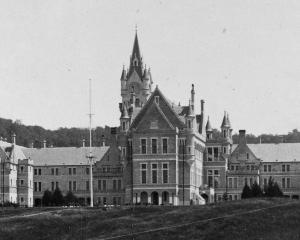Putting the social into enterprise can deliver benefits for everyone.
Social enterprise is a buzz word at the moment.
That's exciting for us because Wanaka Wastebusters has been a social enterprise since we started in 2000, using a business approach to deliver social and environmental goals.
Our goals are to work towards zero waste by reusing and recycling, creating jobs for people from all walks of life and strengthening our local economy.
Like any business we have to be efficient enough to survive in a competitive world.
We need to generate a surplus that we can invest in gear, systems and advocating for waste minimisation in our community and the wider country.
But we're not alone.
Other community recyclers have been using the social enterprise business model since the millennium, when there was a real drive across New Zealand to reduce waste and make more effective use of resources being thrown into landfills.
It's not glamorous work, sorting recycled cans and bottles by hand, and dragging large bits of furniture in and out of second-hand ''tip'' shops.
But nearly everyone I've met who works at a community recycler is proud to do so.
There's something special about creating something from nothing, and there's a real passion for reuse and recycling that resonates with the wider community.
I love that Wanaka people are proud to say their new outfit is from Wastebusters.
People are proud to buy second-hand because they understand that reusing stuff is better for the environment.
Social enterprise is becoming a trendy concept but community recyclers are finding it tougher than ever to survive.
Over the past 10 years big waste companies, many of them overseas owned, have moved into the recycling space.
These waste companies are attracted by the money councils are willing to spend on contracts to collect and process recycling.
They can often collect and process recycling more cheaply than a small local organisation, but without the local jobs, reuse focus or the waste minimisation education that community recyclers bring.
Otago almost lost one of its oldest community recyclers this year, Central Otago Wastebusters in Alexandra.
Working with the Central Otago District Council, Wanaka Wastebusters has taken over Central Otago Wastebusters to ensure that Alexandra and the surrounding communities will still have a Wastebusters.
What made it possible was that the Central Otago District Council recognised the value of keeping Wastebusters going.
Splitting the recycling contract and giving Wastebusters a relatively small part of it ($108,000 to collect and process recycling from drop-offs) made the future of Wastebusters in Alexandra financially viable.
Our experience in Wanaka has been that combining recycling drop-offs, business recycling and a reuse shop is a good mix of services.
The council recognised that having two contractors would cost slightly more but that they provided complementary services.
They also got more jobs in town, increased servicing of the depots at busy times and a commitment to help move the community towards zero waste.
To the council, it's a relatively small amount of money but it will underpin community reuse, recycling and waste minimisation across the district, and keep alive the passion of the volunteers and reuse and recycling champions who set up Central Otago Wastebusters and kept it running for 14 years.
Central Otago District Council recognises the value of having a contractor that shares the goals outlined in their 2012 Waste Minimisation and Management Plan.
It can see that taking a holistic approach to spending means they can achieve several goals with one budget.
• Sadly, things are not looking so positive everywhere for community recycling.
Way back in 1989, the Community Business and Environment Centre (CBEC) set up in Northland.
They used a social enterprise model to create jobs and local economic development.
The late 1980s and early 1990s were tough times for many regional economies.
CBEC started with recycling and reuse and expanded into labour hire, landscaping supplies, a plant nursery and home insulation.
CBEC employs more than 80 people in a region where jobs and investment are scarce.
Three Northland swimming pools threatened with closure have been saved by CBEC, which now manages them for the council. Realising that Kaitaia needed a bus service, CBEC made one happen. There's no question that CBEC brings added value to Kaitaia and Northland. But when the recycling and resource recovery contract held by Cleanstream Northland, a joint venture between CBEC and Te Runanga o Te Rarawa, came up for tender, the Far North District Council gave it to a waste company. Thirty-five Cleanstream employees now face redundancy.
Yes, the district council has saved some money.
But the cheapest provider on paper doesn't always deliver the best value for the community.
Cleanstream Northland has diverted an impressive 68% of the region's waste into reuse and recycling.
By extending the life of the landfill, they have saved the council about $600,000 a year for the next three to five years.
And then there's the multiplier effect.
New Zealand research has found that community recyclers put the highest percentage of dollars they earn back into their local community, followed by New Zealand-based recycling/waste companies, followed by overseas-owned recycling/waste companies.
The Far North District Council acknowledged when it announced the contract outcome that it had been a difficult decision, but said it was bound by legislation to provide services to residents and businesses as cost-effectively as possible.
Not all councils see it like that. Some are realising that lowest-cost contracts do not always deliver the best value.
Auckland Council is one.
Auckland Council strategic adviser Billy Matheson says the breakthrough is taking the council's strategic objectives, including community wellbeing and strategic development, and recognising that ''the way we purchase and the things we purchase are supportive of achieving those goals.
The lowest price is not the best indicator of how well those goals will be delivered on.''
The council has adopted a new purchasing policy, which includes the principle ''Be Sustainable''.
Two community groups have won council contracts to set up community recycling centres in Waiuku and Helensville under the new policy.
Just last week Simpson Grierson released a list of the major issues faced by communities and councils.
Investment was recognised as critical in creating opportunities, with economic growth and job creation the biggest challenge facing mayors and community board chairmen.
Community recyclers have shown they can make council dollars go further when it comes to waste minimisation, job creation and supporting their local economy.
Hopefully more councils will follow the lead of councils such as Auckland and Central Otago and find innovative ways to contract with social enterprise, so their communities can reap the benefits.
• Gina Dempster is communications officer at Wanaka Wastebusters.
Each week in this column, one of a panel of writers addresses issues of sustainability.












